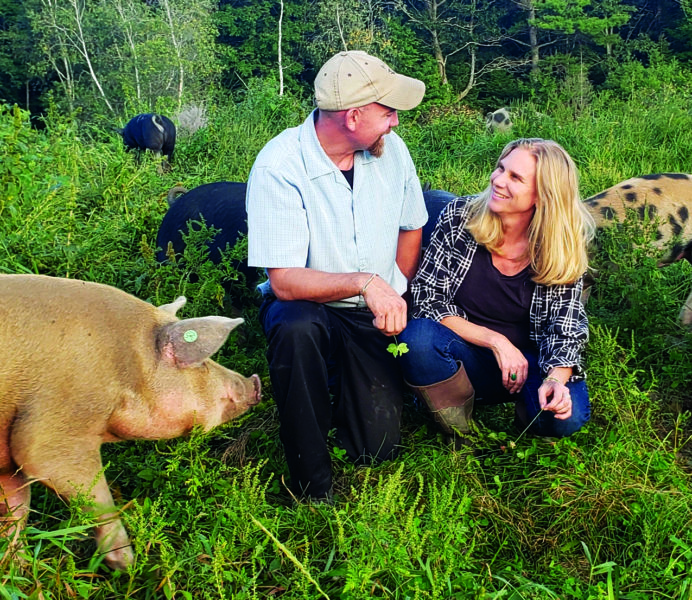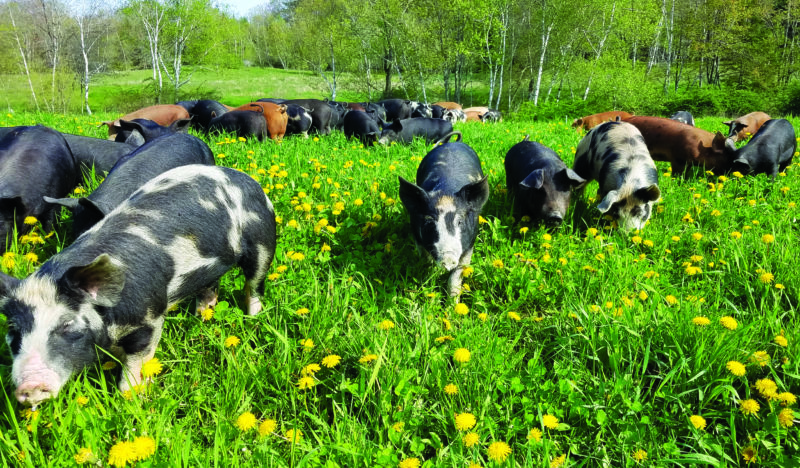
John and Holly Arbuckle, owners of Singing Pastures Farm of Newcastle, sit in a field with their heritage breed pigs. The farm was one of two in Maine to receive a federal grant for value-added producers this year. (Photo courtesy Holly Arbuckle)
A Newcastle farm is one of two in the state this year to receive a U.S. Department of Agriculture grant that helps rural businesses expand processing, marketing, and sales for value-added products.
Singing Prairie Farms, of Newcastle, was recently awarded $215,000 through the federal Value-Added Producer Grant Program, allowing owners Holly and John Arbuckle to develop and sell two flavors of salami: bourbon and uncured bacon, and red wine and garlic.
The line will be sold in New England grocery chains. The Arbuckles currently sell a separate line of pork snack sticks through online markets.
The couple raises pigs on 170 acres at their home at Cowshit Corner, the former Dyer’s Valley Farm in North Newcastle, where they moved their business from La Plata, Mo. in 2018. The farm will have about 160 to 200 heritage breed pigs after spring births this year.
Singing Prairie practices regenerative agriculture, a way of farming that Holly Arbuckle said mimics nature and improves the soil. Her husband John is a ninth-generation farmer who grew up farming corn and soybeans and took his own business in a new direction.
Their animals are also raised without antibiotics, hormones, or genetically modified feed. The meat products are traditionally cured without synthetic nitrates.
Salami is made from trim, a pork product comparable to ground beef, which Holly Arbuckle said farmers often have as leftovers. Up to 50% of their salami will use meat from other pasture-raised pigs in New England and New York, creating a market for those farmers as well.
The couple chose salami partly because “there’s only so many things you can do with a pig,” Holly Arbuckle said, but salami is also a process of “taking something you have extra of and turning it into something with a higher value.”
Eighty percent of income in small farms in America comes from activities off the farm, she said, though that number is close to half in Maine. The salami business adds another stream of income for Singing Pastures, alongside the Roam Sticks, the pork chops they sell to other producers, and more.
“There’s a general belief that you can make more money selling beer than hops,” she said of the reason farmers create value-added products.
To help the farm develop and sell their new product, the grant funds will hire another staff member and contract marketing and sales services.
Because pasture-raised products can’t compete with conventional farms on price, Holly Arbuckle said, producers have to differentiate themselves. She sees Singing Prairie’s product as part of something bigger, a rising demand for pasture-raised meat. Independent farmers can’t compete with corporate farms on price, she said, but they can compete with grass-fed meat, which is too expensive for corporate farms.
“We’re part of a larger movement of farmers who want to farm this way, and they’re trying to find markets,” Holly Arbuckle said. “You can’t be green unless you’re in the black.”
Along with production, the grant will allow Singing Prairie to sell their salami through grocery store chains in New England, a first for the farmers. Roam Sticks will remain available only online.
Getting a product into grocery stores is risky and expensive, Holly Arbuckle said, and the grant is designed to make the process less dangerous for a small business.
The grant is a reimbursement model, meaning the farmers submit expenses to receive funds, rather than being offered a lump sum. Holly Arbuckle said she expects the grant to last one or two years.
Singing Prairie is unlikely to expand its product lines again in the future, and if the operation grows, it will likely be into other flavors and sales regions.
Holly Arbuckle said the new salami product will be marketed towards grocery store chains, rather than local markets, to reach further.
“We’re trying to offer an alternative that can still support independent farmers in things people are going to buy anyway,” outside of the farmer’s market, she said.
For more information or to order meat products, go to singingpastures.com.

Heritage breed pigs at Singing Prairie Farm in Newcastle. Owners John and Holly Arbuckle received a U.S. Department of Agriculture grant for $215,000, which will be used to expand marketing, processing, and develop and sell a new salami line. (Photo courtesy Holly Arbuckle)






